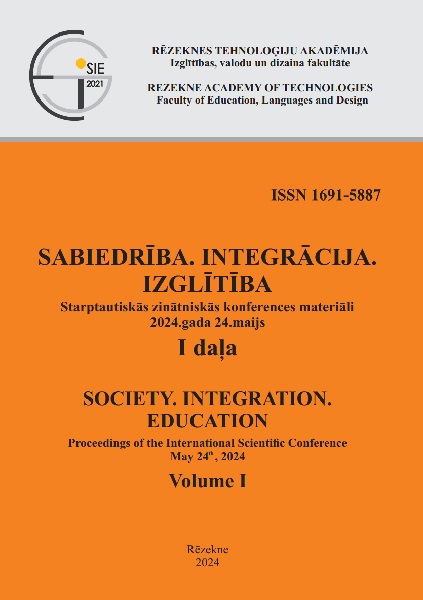THE POTENTIAL OF THE SCHOOL LIBRARY TO PROMOTE’STUDENTS’ SELF-DIRECTED LEARNING
DOI:
https://doi.org/10.17770/sie2024vol1.7903Keywords:
interest in reading, librarian, reading, school lilbrary, self-directed learning, studentsAbstract
Motivating students to read more is becoming increasingly important nowadays. The ability to understand the meaning of a text, to analyse, critically evaluate and verify the information and facts, as well as formulate one's own opinion - this is a skill that is vital for modern people living in the 21st century - the century of fake news. The latest PISA 2022 study shows that average reading performance in Latvia has fallen in comparison to 2018 results. The average reading achievement of pupils of Latvia has been falling every year since 2012. The challenge for schools is to use their internal resources to stimulate pupils' interest in reading in order to break this trend. One of the school's internal resources is a library. The school library has an important role to play in motivating pupils to read and to learn. It is an environment that encourages and supports reading and self-directed learning. The aim of this publication is to describe possibilities of raising reading interest and self-directed learning opportunities in school library.
References
Alwadaeen, N. B., & Piller, B. (2022). Enhancing Self-Directed Learning Readiness at Elementary Level; A Study from American Schools. Journal of Curriculum and Teaching, 11(4), 24-38.
Braše, L. (2010). Ģimenes loma skolēnu socializācijā. Rīga: RaKa, 133 lpp.
Geske, A., Grīnfelds, A., Kangro, A., Kiseļova, R., Stūre, B. (2020). A.Kangro (Red.) Monogrāfija: Latvijas skolēnu sasniegumi un skolas vide OECD PISA salīdzinājumā. Pieejams: https://www.ipi.lu.lv/fileadmin/user_upload/lu_portal/projekti/ipi/PISA/PISA2015_sekundarie_petijumi.pdf
Goulmens, D. (2001). Tava emocionālā inteliģence. Rīga: Jumava, 461 lpp.
Kuhltha, C. (2010). Guided inquiry: School libraries in the 21st century. School libraries worldwide, 1-12.
Kūle, M., Kūlis, R. (1996). Filosofija. Rīga: Apgāds “Burtnieks”, 656 lpp.
Lee, V. R., Poole, F., Clarke-Midura, J., Recker, M., & Rasmussen, M. (2020). Introducing coding through tabletop board games and their digital instantiations across elementary classrooms and school libraries. In Proceedings of the 51st ACM Technical Symposium on Computer Science Education (pp. 787-793).
Līsmans, K., P. (2022). Izglītība kā provokācija. Rīga: Jāņa Rozes apgāds, 192 lpp.
Maļicka, J. (2004). Piederības izjūta un mācību motivācija. Rīga: RaKa, 129 lpp.
Pieper, K. (2017). Reading for Pleasure: A Passport to Everywhere.Independent Carmarthen: Thinking Press an imprint of Crown House Publishing.
Laškova, A., & Ročāne, M. (2023, July). THE CONTEMPORARY RELEVANCE, BARRIERS AND BENEFITS OF THE DEVELOPMENT OF READING INTEREST IN LOWER SECONDARY EDUCATION. In SOCIETY. INTEGRATION. EDUCATION. Proceedings of the International Scientific Conference (Vol. 1, pp. 623-632).
Latvijas Republikas Saeima. (1998). Bibliotēku likums. Latvijas Republikas likums. Pieejams: https://likumi.lv/ta/id/48567-biblioteku-likums
OECD, (2023). PISA 2022 Results. Pieejams: https://www.oecd.org/publication/pisa-2022-results/webbooks/dynamic/pisa-country-notes/f58bca29/pdf/latvia.pdf
Ozola, A., Kivleniece, S. (2023). Skolēnu lasītprasme: vai ir pamats bažām un kā vairot lasītprieku. Pieejams: https://lvportals.lv/norises/356049-skolenu-lasitprasme-vai-ir-pamats-bazam-un-ka-vairot-lasitprieku-2023
Rutka, L. (2012). Pedagoga psiholoģiskā kompetence. Rīga: RaKa, 178 lpp.
Schultz-Jones, B., & Ledbetter, C. (2021). School Libraries as Learning Environments: Examining Elementary School Students' Perceptions. In IASL Annual Conference Proceedings.
Skola2030, (n. d.). Skola kā mācīšanās organizācija. Pieejams: https://www.skola2030.lv/lv/istenosana/macibu-pieeja/macibu-organizacija-skola
Špona, A. (2001). Audzināšanas teorija un prakse. Rīga: RaKa, 162 lpp.
Šteinberga, A. (2013). Pedagoģiskā psiholoģija. Rīga: RaKa, 176 lpp.
Wojciechowska, M. (2022). The Role of social capital in education. Results of a survey on the individual social capital of school librarians. Profesional de la información, 31(6).
Zimmerman, B. J. (2001). Theories of self-regulated learning andacademic achievement: An overview and analysis. In B. J. Zimmerman & D. H. Schunk (Eds.), Self-regulated learning and academic achievement: Theoretical perspectives (pp. 1-37). Mahwah, NJ, US: Lawrence Erlbaum Associates Publishers.
Zimmerman, B. J., & Schunk, D. H. (2011). Self-regulated learning and performance: An introduction and an overview. Handbook of self-regulation of learning and performance, 15-26.
Zvirbule, A. (2004). Kultūrvides izglītība. Rīga: RaKa, 122 lpp.






